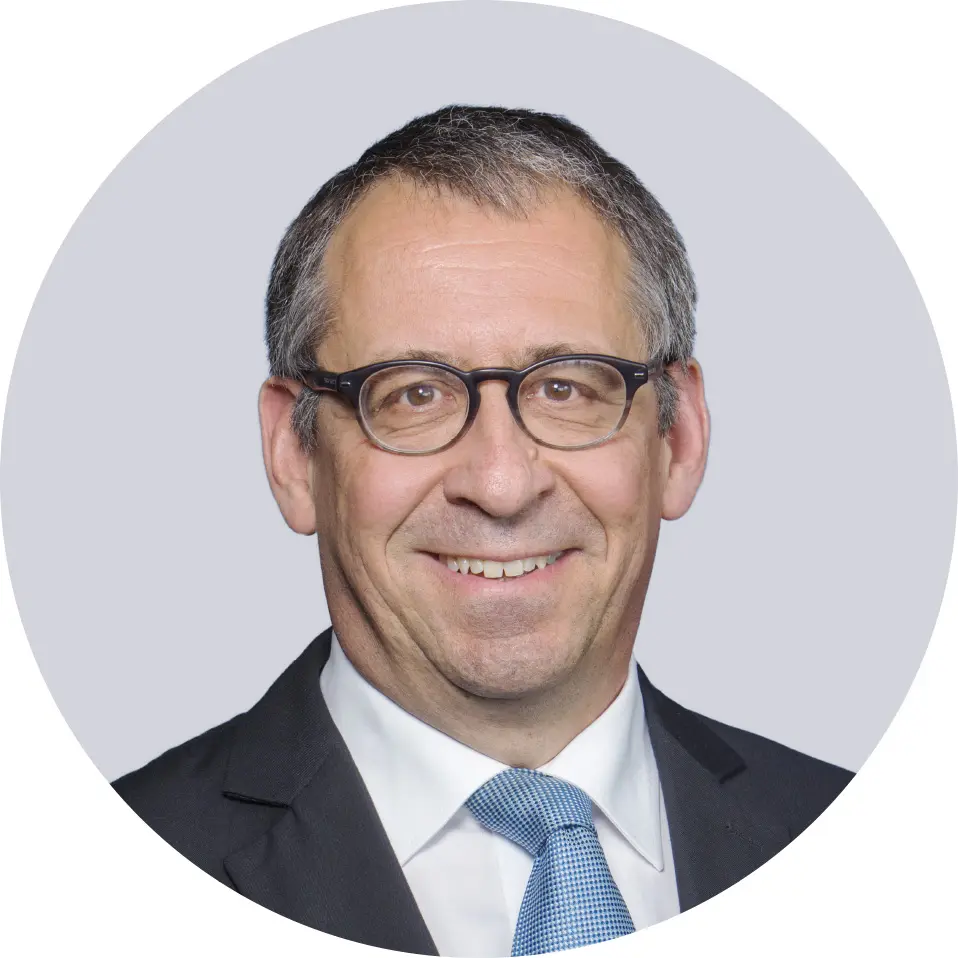Editorials Annual Report 2023
Committed to society

Freedom is a valuable asset, especially when it comes to university teaching and research. This freedom is even guaranteed in the Federal Constitution of Switzerland. Many Swiss people might take this for granted, but it is not a matter of course, particularly in today’s world of hasty thoughts and loud accusations. We need places where we can quietly ponder and explored issues in detail. We need free universities where there is room for critical thinking.
However, freedom is always linked to responsibility. Responsibility towards society for its support of universities, as well as responsibility towards the state, which creates a reliable framework for teaching and research.
The government of Zurich intends to restructure the relationship between universities and the state, and we plan to do so with an ownership strategy. On the one hand, this strategy aims to ensure that universities remain free. On the other hand, it regulates supervision by the Cantonal Parliament and the Government Council. I see the role of politics in supporting universities by providing the necessary financial resources. At the same time, policymakers need to be able to set strategic goals. The canton expects universities to provide transparent information about how they are developing. These are the elements of the new ownership strategy. It benefits everyone involved and allows universities to conduct their excellent work – in the name of science and society.
Universities of applied sciences in particular can give a great deal back to society. They teach and conduct research close to people’s everyday lives, be it by looking for new ways of sustainable construction or thinking about preventive healthcare. By creating art and strengthening our region’s creative industries. Or by shaping our future by training the role models of the coming generation: teachers.
The universities of applied sciences’ close ties to society are particularly evident in their vocational degree programmes. They facilitate links between vocational training, businesses and universities. It is no coincidence that the successful model of universities of applied sciences is attracting a great deal of interest abroad – especially in times of political and economic uncertainty. Universities of applied sciences train skilled professionals who are in demand on the market.
Skilled professionals are not just specialists in their respective fields. During their training, they also learn to apply their knowledge responsibly, which is more important than ever. After all, our world is turning ever faster and the call for supposedly simple solutions is getting louder and louder. This further emphasises the relevance of places like our universities, where people can think about solutions in peace and quiet. This freedom must remain the greatest asset of our universities. I will continue to advocate for this.
Dr. Silvia Steiner, Government Councillor and President of the Council of the Zurich Universities of Applied Sciences and Arts
Tackling current challenges
Universities play a significant role in helping to overcome the numerous challenges our society is currently facing. One of the most urgent challenges is climate change and thus the need to develop sustainable energy systems. One of the projects ZHAW researchers are involved in is the national energy research programme SWEET (SWiss Energy research for the Energy Transition), in which they are collaborating in transdisciplinary and interdisciplinary research groups to find possible solutions for the transition of the Swiss energy system. With their work, they are significantly contributing to the successful implementation of the Energy Strategy 2050 and helping Switzerland achieve its climate targets. ZHAW research teams succeeded in identifying various potentials for an efficient energy production, such as the contribution of alpine solar plants or agrivoltaics. These technologies help strengthen Switzerland’s energy supply without the need to build new fossil fuel power plants. Other research projects aim to substitute fossil energy sources, including the use of hydrogen as a fuel in gas turbines or seasonal energy storage. Expanding these systems will facilitate the substitution with renewable energy.
To meet the challenges posed by climate change, a growing world population and dwindling natural resources, the ZHAW is addressing the issue of sustainable nutrition. Under the slogan of Regenerative Food for Planetary Health, the ZHAW is focusing on the local and regional influence on the future of nutrition in Switzerland. In Wädenswil, at the brand-new Future of Food campus, employees and students are researching the entire food value chain – from the raw material and processing to quality management and marketing – and are thereby supporting its transformation. Examples of their research include developing sustainable packaging made from organic or recyclable materials or testing how fermentation can be used to make foods more enjoyable and easier to digest. Moreover, they are researching how valuable residues from food processing can be utilised for nutritional purposes. For instance, cocoa bean shells can be added to chocolate ice cream, while wheat bran can be used in spaghetti.
Joining the European Engineering Learning Innovation and Science Alliance (EELISA) allows the ZHAW to cooperate with high-ranking universities in the EU and strengthen its partnerships within Europe. The integration into the European Higher Education Area is an important step to prepare students for a global work environment and to form research collaborations within EU projects. As a result of this membership, the ZHAW has successfully signed Consortium and Grant Agreements. Furthermore, several participants have now registered in ZHAW courses listed in the EELISA course catalogue, such as aquaponics. Another milestone is the foundation of the ecological engineering community initiated by the ZHAW. This project allows students as well as academic and technical staff to work on developments relating to current societal issues. This academic exchange has further been strengthened through the EELISA Days in November and joint activities such as lectures, exhibitions or hackathons with over 3,600 participants.
The current societal challenges call for new solutions. This is why the ZHAW is playing an active part in shaping them.
Dr. Michael Alkalay, Member of the Council of the Zurich University of Applied Sciences and Arts, ZHAW consultant
Dr. Matthias Kaiserswerth, Member of the Council of the Zurich University of Applied Sciences and Arts, ZHAW consultant
Ulrich Jakob Looser, Member of the Council of the Zurich University of Applied Sciences and Arts, ZHAW consultant
Prof. Dr. Andrea Schenker-Wicki, Member of the Council of the Zurich University of Applied Sciences and Arts, ZHAW consultant
Crucial steps on our path

Whether it comes to history, culture, economics or history of education, Switzerland is part of Europe. The ZHAW has been working towards gaining a firm foothold in the European Higher Education Area for years by participating in EU research projects, joining the European University Association (EUA) and cooperating in student exchanges. This is fully in line with the university’s strategy. However, we must now do more to meet the global challenges in education and research. Doing so requires institutional collaboration in a European University, in alliances of higher education institutions that are recognised and supported by the European Commission
A crucial step towards this goal was taken in 2023. Since January, the ZHAW has been a member of a European University – the European Engineering Learning Innovation and Science Alliance (EELISA), a group of ten universities from eight European countries. Together, they want to contribute to the further development of higher education in Europe. The ZHAW will mainly be involved in two focus areas, Innovation and Entrepreneurship and Employability and Partnerships. In the latter, the university can share its vast knowledge and experience thanks to its strong focus on applied and practice-oriented education and its close ties with economic and business partners and associations. Further exciting prospects available to the ZHAW include student exchange programs, a shared range of modules, joint degrees and doctoral programmes as well as access to exchange platforms for sustainable development and research collaborations as part of EU projects.
In the context of EELISA and other projects, the ZHAW would like to work on Open Innovation, which is a key element of the Open Science movement. The aim is to foster innovations by sharing knowledge and infrastructure. Universities have a responsibility to encourage collaborative innovation processes. This has been demonstrated in an exemplary way in the case of the Proof of Concept Lab in Winterthur. Or in the new Future of Food campus in Wädenswil, where researchers and students contribute to building a sustainable, enjoyable and healthy diet of the future. The ZHAW also fosters Open Innovation with the “ZHAW entrepreneurship” strategic initiative, promoting its continued development as an entrepreneurial university.
The ZHAW reached further milestones by implementing the new personnel ordinance of Zurich Universities of Applied Sciences for academic staff. While allocating staff to the new personnel categories, the ZHAW was able to maintain the balance between the different interests and protect its function as an expert organisation. The new personnel ordinance is an important basis for working conditions and personnel development that meets the needs of a university. This will strengthen the appeal of the ZHAW as an employer and enable long-term ties with young talents – a central requirement for the future viability of the ZHAW.
These are crucial steps that now allow us to move in the right direction.
Prof. Dr. Jean Marc Piveteau, President